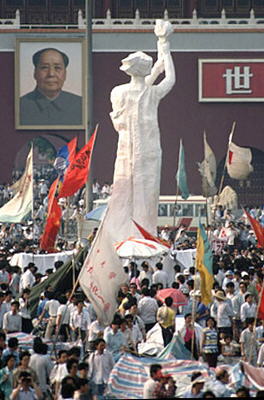 Despite a decade of America being dumped on from every corner of the world, and with the current administration apologizing for our very exsistence, Herbert London argues that American cultural influence throughout the world will continue into the 21st Century.
Despite a decade of America being dumped on from every corner of the world, and with the current administration apologizing for our very exsistence, Herbert London argues that American cultural influence throughout the world will continue into the 21st Century.
Richard Pells, a professor of history at the University of Texas, in a recent book contends that “For most of the 20th century, the dominant culture in the world was American. Now that is no longer true.” He goes on to contend that people abroad “are increasingly indifferent to American culture.”
According to Professor Pell, who has taught in Europe, Asia and Latin America, queries about American cultural figures are infrequent, as opposed to some imprecise past when George Gershwin, Louis Armstrong, Duke Ellington among others were admired as icons. Pell goes on to contend that twentieth century literary figures such as Bellow, Faulkner, Hemingway, Dos Passos and Steinbeck were worshipped internationally as opposed to their contemporary literary counterparts.
He does concede that there are a few American cultural figures, viz. Bruce Springstein, who can electrify audiences abroad, but they are the exception rather than the rule. The importance of Mumbai as a center for Indian filmmaking instead of Hollywood, was reinforced as an example of home grown cultural forms when “Slumdog Millionaire” won the Oscar for best picture.
Pells contends that the reason for this development is the role globalization plays in subordinating American influence. Instead of spreading American culture, he argues, globalization has strengthened the cultures of other nations putting them in a competitive position with the United States. He assembles selective evidence to support this thesis such as declining ticket sales for American films in France and South Korea. While Pells appreciates the obvious fact American culture is not “irrelevant,” it is “doubtful that America will ever again be the world’s preeminent culture, as it was in the 20th century. That is not a cause for regret. Perhaps we are all better off in a world made in America.”
Perhaps Pells is right. But I, for one, don’t buy his argument. In my peregrinations around the globe America is as popular as ever. Local cultural activity is invariably measured by an American standard. European basketball, for example, is always compared to the NBA. “Slumdog Millionaire” was based on an American game show, and distributed by an American company. Tee shirts featuring LeBron James are best selling items all over Asia. Paris bookstores feature books by and about President Obama.
Alas, ticket sales for American films are declining in Europe, but that may be due more to the distribution of marginal films than a diminished interest in American popular culture. It is instructive that Chinese freedom fighters at Tiananmen Square in 1988 didn’t construct a facsimile of the Eiffel Tower or a bust of Confucius; they built a version of the Statue of Liberty. America, for better of worse, is the cultural model for most Chinese youth.
Japanese youngsters have, fallen in love with Western cowboy garb. It goes without saying that Japan doesn’t have cowboys. Yet fringe jackets and Stetsons are very much in vogue. Even the French, who put a premium on their au courant styling, are increasingly influenced by Ralph Lauren designs.
Clearly this isn’t a one-way street. Americans are influenced by cultural trends abroad, but this has always been the case. Hudson River painters studied in Italy. Jerome Kern had to pretend he was British in order to obtain acceptance of his music in the United States. And Ichiro Suzuki has added a new dimension to American baseball with his unique batting style.
It is hard to predict what the contours of 21st century culture might be. In my opinion, however, America will be at the center, the locus of the most innovation and the catalyst for themes that are irresistibly emulated. Yes, I believe that the 21st century will be the American century just as the century that passed, globalization to the contrary notwithstanding.
—Herbert London
President, Hudson Institute
Professor Emeritus, NYU, Author of Decade of Denial, Lexington Books and America’s Secular Challenge, Encounter Books
